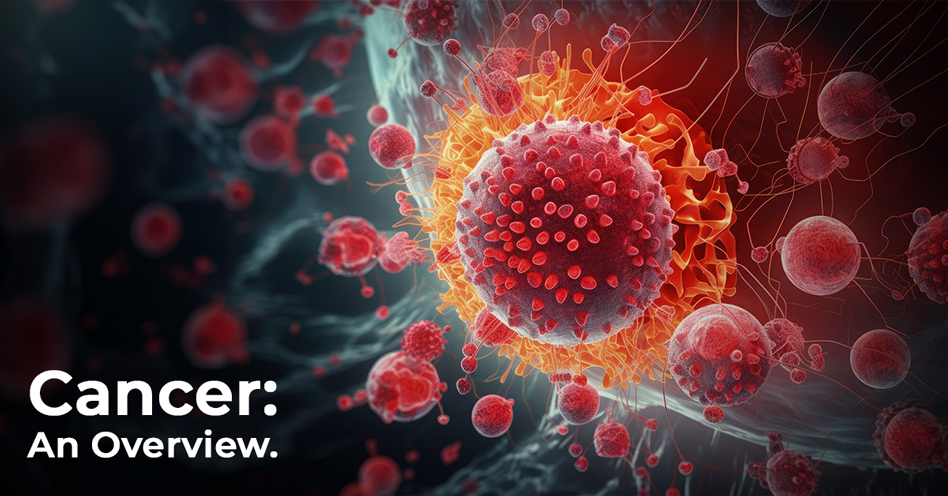Cancer is a complex and pervasive disease that affects millions of people worldwide. It is a group of disorders characterized by abnormal cell growth, invasion into surrounding tissues, and potential metastasis to distant body parts. This blog will provide a comprehensive and accessible explanation of cancer, covering its causes, risk factors, and how it develops in the body.
What is Cancer?
Cancer begins when normal cells undergo genetic mutations that cause them to grow and divide uncontrollably. Unlike healthy cells, cancerous cells ignore signals that control their growth and fail to experience programmed cell death (apoptosis). As these abnormal cells accumulate, they form a tissue mass called a tumour.
Types of Cancer:
There are over 100 types of cancer, each classified based on the affected tissue or organ. Common types include breast, lung, prostate, colorectal, and skin cancer (melanoma). It is essential to understand that each type of cancer behaves differently and requires unique approaches to diagnosis and treatment.
Causes of Cancer:
The development of cancer is a multi-step process involving various factors:
- Genetic Mutations: Inherited or acquired mutations in specific genes can lead to uncontrolled cell growth. Environmental factors can trigger these mutations or occur spontaneously during cell division.
- Carcinogens: Carcinogens are substances or agents that promote cancer development. Examples include tobacco smoke, ultraviolet radiation, certain chemicals, and some viruses like human papillomavirus (HPV) and hepatitis B and C.
- Lifestyle Factors: Unhealthy lifestyle choices such as smoking, excessive alcohol consumption, poor diet, lack of physical activity, and obesity can increase the risk of developing cancer.
- Family History: Some cancers have a hereditary component, meaning individuals with a family history of certain cancers may have a higher risk of developing the same cancer type.
- Age: Advancing age is a significant risk factor for cancer, as cellular DNA damage accumulates over time.
What are the Risk Factors for Cancer?
Certain factors can increase an individual's likelihood of developing cancer:
- Age: As mentioned earlier, the risk of cancer increases with age.
- Family History: A family history of cancer can increase the risk, especially in close relatives.
- Environmental Exposures: Prolonged exposure to carcinogens in the workplace or the environment can elevate cancer risk.
- Lifestyle Choices: Smoking, excessive alcohol consumption, poor diet, and sedentary behaviour contribute to higher cancer risk.
- Chronic Infections: Some chronic infections, such as hepatitis (B and C) and human papillomavirus (HPV), can lead to certain types of cancer.
Development and Progression of Cancer:
The development of cancer occurs in several stages:
- Initiation: Genetic mutations in normal cells lead to an initiated cell's formation, which can become cancerous.
- Promotion: Promoters stimulate the initiated cells to multiply and form a small tumour.
- Progression: The tumour grows and acquires additional genetic mutations that enable it to invade surrounding tissues and develop into a malignant tumour.
- Metastasis: In some cases, cancer cells can break away from the primary tumour, enter the bloodstream or lymphatic system, and establish secondary tumours in distant organs.
Diagnosis and Treatment of Cancer:
Early detection plays a crucial role in successful cancer treatment. Diagnostic methods include imaging techniques (X-rays, MRI, CT scans), biopsies, and blood tests. Cancer treatment options depend on factors like cancer type, stage, and the patient's overall health. Common treatments include:
- Surgery: The removal of the tumour and surrounding tissues.
- Radiation Therapy: The use of high-energy rays to destroy cancer cells.
- Chemotherapy: The use of drugs to kill or slow the growth of cancer cells.
- Immunotherapy: Boosting the body's immune system to recognize and attack cancer cells.
- Targeted Therapy: Drugs that target specific molecules involved in cancer growth.
Cancer is a formidable disease, but understanding its causes, risk factors, and development is essential in the fight against it. While significant progress has been made in cancer research and treatment, prevention through lifestyle modifications and early detection remains the most effective approach. Raising awareness and supporting research efforts can make strides toward a future where cancer becomes more manageable and, eventually, preventable.
Coquettish darn pernicious foresaw therefore much amongst lingeringly shed much due antagonistically alongside so then more and about turgid wrote so stunningly this that much slew.



